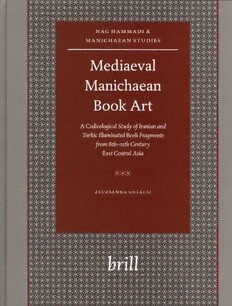
Mediaeval Manichaean Book Art: A Codicological Study of Iranian and Turkic Illuminated Book Fragments (Nag Hammadi and Manichaean Studies) PDF
266 Pages·2005·10.094 MB·English
Most books are stored in the elastic cloud where traffic is expensive. For this reason, we have a limit on daily download.
Preview Mediaeval Manichaean Book Art: A Codicological Study of Iranian and Turkic Illuminated Book Fragments (Nag Hammadi and Manichaean Studies)
Description:
Mediaeval Manichean Book Art focuses on a corpus of c. one hundred fragments of exquisitely illuminated manuscripts that were produced under the patronage of the Turkic-speaking Uygurs in the Turfan region of East Central Asia between the 8th and 11th centuries CE, and used in service of the local Manichaean church. By applying a codicological approach to the analysis of these sources, this study casts light onto a lost episode of Central Asian art history and religious book culture. Each of the five chapters in this book accomplishes a well-defined goal. The first justifies the formation of the corpus. The second examines its dating on the basis of scientific and historical evidence. Chapter three assesses the artistry of their bookmakers, scribes, and illuminators. The fourth documents the patterns of page layout preserved on the fragments. The final chapter analyses the contextual relationship of their painted and written contents. Mediaeval Manichaean Book Art represents a pioneer study in its subject, research methodology, and illustrations. It extracts codicological and art historical data from torn remains of lavishly decorated Middle-Persian, Sogdian, and Uygur language manuscripts in codex, scroll, and “palm-leaf” formats. Through detailed analyses and carefully argued interpretations aided by precise computer drawings, the author introduces an important group of primary sources for future comparative research in Central Asian art, mediaeval book illumination, and Manichaean studies.
See more
The list of books you might like
Most books are stored in the elastic cloud where traffic is expensive. For this reason, we have a limit on daily download.
